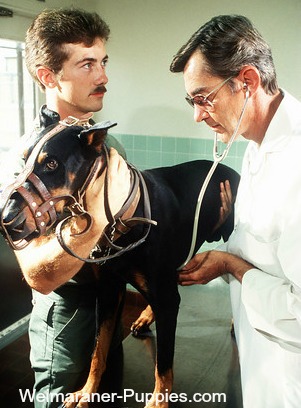Von Willebrand disease in dogs is a condition that closely resembles hemophilia in humans. The disease (abbreviation, vWD) is hereditary and is seen in a small number of dog breeds.
Unfortunately, Weimaraners are one of the dog breeds who are born with hereditary canine von Willebrand Disease.
What is von Willebrand Disease in Dogs?
Von Willebrand Disease is a bleeding disorder caused by low levels or a lack of the protein known as the von Willebrand factor.
This protein is named Factor VIII. The von Willebrand factor regulates the first step in clot formation.

Von Willebrand Disease in dogs is hereditary, and it is commonly seen in the following dog breeds:
- Weimaraners
- Doberman Pinschers
- German Shepherds
- Golden Retrievers
- Miniature Schnauzers
- Pembroke Welsh
- Gorgis
- Shetland Sheepdogs
- Basset Hounds
- Scottish Terriers
- Standard Poodles
- Standard Manchester Terriers
Von Willebrand disease is the most common disease inherited by dogs.
Symptoms of von Willebrand Disease
As a pet owner you may not be aware of a bleeding problem in your dog, until your dog gets a minor cut or scratch and bleeds excessively.
Sometimes a hunter discovers the problem when his Weimaraner get a minor scratch or cut while hunting or training for hunting. In the field, this is an emergency!
Or, sometimes a puppy bleeds a lot after a vaccination or surgery. If blood loss is more than normal, that is a tip-off that there is probably an issue.
A DNA test is available for a few breeds, and the Weimaraner is one of them. The test is accurate and your vet can do the test.
Two Types of Von Willebrand Disease in Dogs
Type I
This type is the least common, and it is either deadly or the dog is a carrier for the disease, but shows no symptoms. There is a DNA test for some breeds, that will show with total accuracy whether the dog is affected or is a carrier of vWD.
Type II
This type is the most common form. If your dog has this kind of canine von Willebrand Disease, she may have nose bleeds, bleeding from her gums and blood in her urine or stools.
Sometimes an owner discovers the disease when his puppy bleeds excessively after a vaccination or minor surgery.
Von Willebrand disease in dogs is often confused with platelet disorders. In order to be certain of the diagnosis, your vet will order laboratory tests.
If your dog has canine Von Willebrand’s Disease, the treatment is transfusions with whole blood or blood plasma.
Unfortunately, if your Weimaraner has von Willebrand Disease, she is not a good candidate for hunting. Bleeding from even small wounds is excessive and dangerous for your dog.




Leave a Reply